精选最新人教版八年级英语下册复习全册讲义
- 格式:ppt
- 大小:3.18 MB
- 文档页数:10
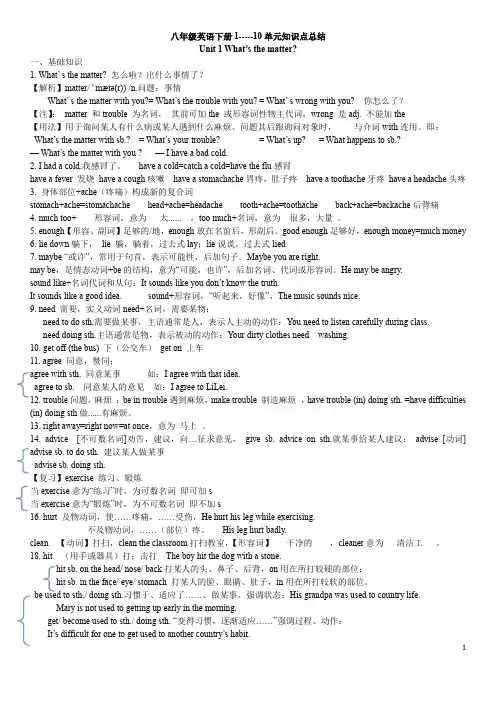
八年级英语下册1-----10单元知识点总结Unit 1 What’s the matter?一、基础知识1. What’ s the matter? 怎么啦?出什么事情了?【解析】matter/ ' mætə(r)) /n.问题;事情What’ s the matter with you?= What’s the trouble with you? = What’ s wrong with you? 你怎么了?【注】:matter 和trouble 为名词,其前可加the 或形容词性物主代词,wrong 是adj. 不能加the【用法】用于询问某人有什么病或某人遇到什么麻烦、问题其后跟询问对象时,与介词with连用。
即:What’s the matter with sb.? = What’s your trouble? = What’s up? = What happens to sb.?— What’s the matter with you ? — I have a bad cold.2. I had a cold.我感冒了。
have a cold=catch a cold=have the flu感冒have a fever 发烧have a cough咳嗽have a stomachache胃疼,肚子疼have a toothache牙疼have a headache头疼3. 身体部位+ache(疼痛)构成新的复合词stomach+ache=stomachache head+ache=headache tooth+ache=toothache back+ache=backache后背痛4. much too+ 形容词,意为太...... ,too much+名词,意为很多,大量。
5. enough【形容、副词】足够的/地,enough放在名前后,形副后。
good enough足够好,enough money=much money6. lie down躺下,lie 躺,躺着,过去式lay;lie说谎,过去式lied7. maybe “或许”,常用于句首,表示可能性,后加句子。
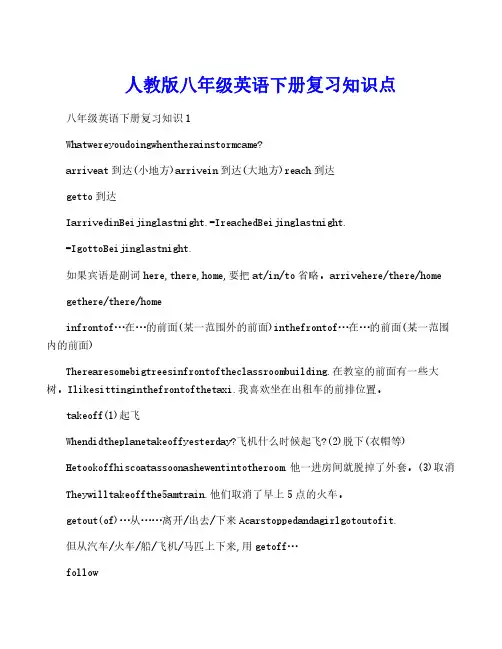
人教版八年级英语下册复习知识点八年级英语下册复习知识1Whatwereyoudoingwhentherainstormcame?arriveat到达(小地方)arrivein到达(大地方)reach到达getto到达IarrivedinBeijinglastnight.=IreachedBeijinglastnight.=IgottoBeijinglastnight.如果宾语是副词here,there,home,要把at/in/to省略。
arrivehere/there/homegethere/there/homeinfrontof…在…的前面(某一范围外的前面)inthefrontof…在…的前面(某一范围内的前面)Therearesomebigtreesinfrontoftheclassroombuilding.在教室的前面有一些大树。
Ilikesittinginthefrontofthetaxi.我喜欢坐在出租车的前排位置。
takeoff(1)起飞Whendidtheplanetakeoffyesterday?飞机什么时候起飞?(2)脱下(衣帽等)Hetookoffhiscoatassoonashewentintotheroom.他一进房间就脱掉了外套。
(3)取消Theywilltakeoffthe5amtrain.他们取消了早上5点的火车。
getout(of)…从……离开/出去/下来Acarstoppedandagirlgotoutofit.但从汽车/火车/船/飞机/马匹上下来,用getoff…follow跟随Ifollowedhimuphehill.我跟着他上了山.沿着……前进Followthisroaduntilyougettothepostoffice.顺着这条路一直到邮局.(3)听懂,理解Couldyouspeakmoreslowly?Ican’tfollowyou.你能说慢点吗?我听不(4)followsb.todosth.跟着某人做某事Pleasefollowmetoreadthestory.请跟我读这个。
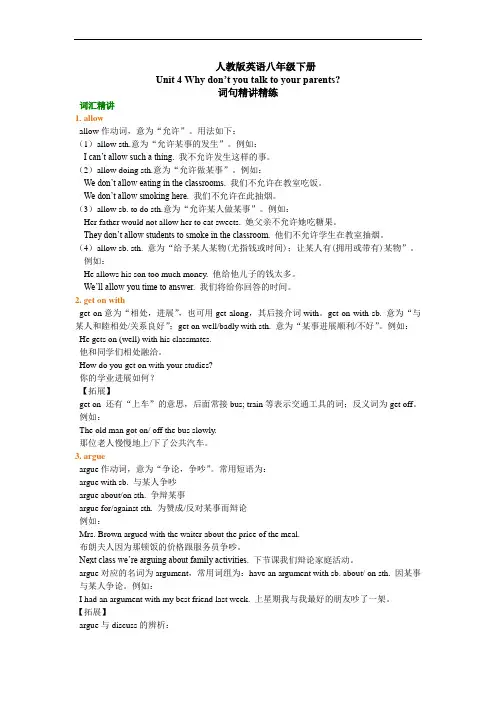
人教版英语八年级下册Unit 4 Why don’t you talk to your parents?词句精讲精练词汇精讲1. allowallow作动词,意为“允许”。
用法如下:(1)allow sth.意为“允许某事的发生”。
例如:I can’t allow such a thing. 我不允许发生这样的事。
(2)allow doing sth.意为“允许做某事”。
例如:We don’t allow eating in the classrooms. 我们不允许在教室吃饭。
We don’t allow smoking here. 我们不允许在此抽烟。
(3)allow sb. to do sth.意为“允许某人做某事”。
例如:Her father would not allow her to eat sweets. 她父亲不允许她吃糖果。
They don’t allow students to smoke in the classroom. 他们不允许学生在教室抽烟。
(4)allow sb. sth. 意为“给予某人某物(尤指钱或时间);让某人有(拥用或带有)某物”。
例如:He allows his son too much money. 他给他儿子的钱太多。
We’ll allow you time to answer. 我们将给你回答的时间。
2. get on withget on意为“相处,进展”,也可用get along,其后接介词with。
get on with sb. 意为“与某人和睦相处/关系良好”;get on well/badly with sth. 意为“某事进展顺利/不好”。
例如:He gets on (well) with his classmates.他和同学们相处融洽。
How do you get on with your studies?你的学业进展如何?【拓展】get on 还有“上车”的意思,后面常接bus; train等表示交通工具的词;反义词为get off。
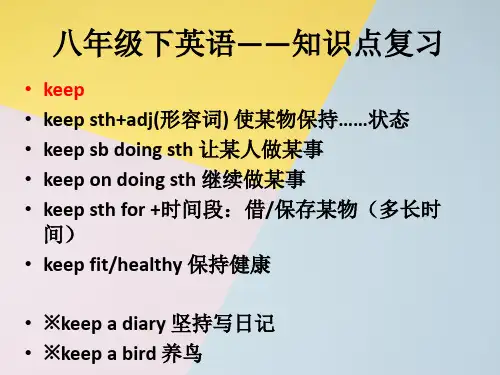
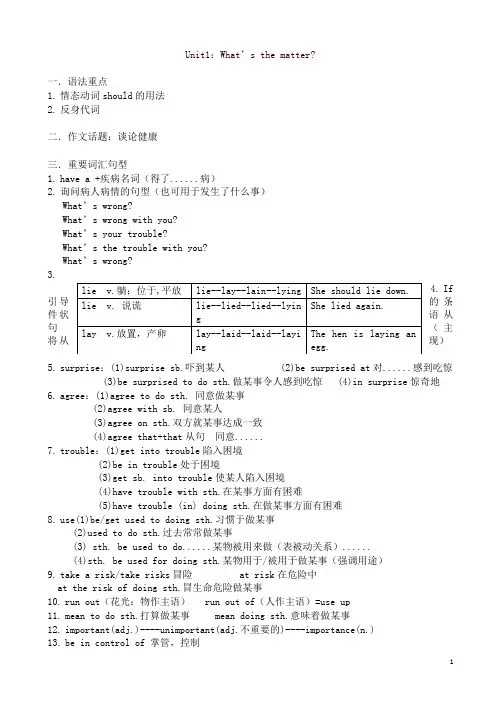
Unit1:What’s the matter?一.语法重点1.情态动词should的用法2.反身代词二.作文话题:谈论健康三.重要词汇句型1.have a +疾病名词(得了......病)2.询问病人病情的句型(也可用于发生了什么事)What’s wrong?What’s wrong with you?What’s your trouble?What’s the trouble with you?What’s wrong?3.4.If 引导的条件状语从句(主将从现)5.surprise:(1)surprise sb.吓到某人 (2)be surprised at对......感到吃惊 (3)be surprised to do sth.做某事令人感到吃惊 (4)in surprise惊奇地6.agree:(1)agree to do sth. 同意做某事(2)agree with sb. 同意某人(3)agree on sth.双方就某事达成一致(4)agree that+that从句同意......7.trouble:(1)get into trouble陷入困境(2)be in trouble处于困境(3)get sb. into trouble使某人陷入困境(4)have trouble with sth.在某事方面有困难(5)have trouble (in) doing sth.在做某事方面有困难e(1)be/get used to doing sth.习惯于做某事(2)used to do sth.过去常常做某事(3) sth. be used to do......某物被用来做(表被动关系)......(4)sth. be used for doing sth.某物用于/被用于做某事(强调用途)9.take a risk/take risks冒险at risk在危险中at the risk of doing sth.冒生命危险做某事10.run out(花光:物作主语) run out of(人作主语)=use up11.mean to do sth.打算做某事 mean doing sth.意味着做某事12.important(adj.)----unimportant(adj.不重要的)----importance(n.)14.cut词组:1. cut out删除;删去 2. cut up切碎 3. cut off切掉;停止4. cut down砍到;降低5. cut in插嘴;超车;插队Unit2: I’ll help to clean up the city parks.一.语法重点1.动词不定式2.动词短语二.作文话题:提供帮助,义务活动三.重要词汇句型1.volunteer:v.自愿(做某事) volunteer to do sth. volunteer for sth.n. 志愿者adj. 志愿的;自愿的 a volunteer job2.疑问词+动词不定式=宾语从句I really can’t decide where I should go.=I really can’t decide where to go.3.such+a(n) +形容词+名词=so+形容词+a(n)+名词She is such a beautiful girl.=She is so beautiful a girl.4.satisfaction(n.满意)--satisfy(v.使满意)--satisfied(adj.满意的)--satisfying(令人满意的)to one’s satisfaction使/令某人满意/满足 be satisfied with对......感到满意 be satisfied to do sth. 对做某事感到满意5.raise...for...为...筹集...6.look like外表上看起来像 take after指因血缘关系在性格,性格,行为上相像7.make/think/find/believe/feel it +形容词+to do sth. 使/觉得/发现/相信/感觉做某事......8.make a difference to对......产生影响9.imagine: (1)imagine doing sth.想象做某事(2)imagine sb. to do sth.想象某人做某事(3)imagine that/what 想象......10.train: v. 训练 n. 火车 training n.训练;培训(1)train sb./sth. to do sth.训练某人/某物去做某事(2)train sb. in sth. 在某方面训练/培养某人11.understand=follow=catch理解;听懂understanding adj.善解人意的;体谅人的12.change v. 改变;变化 change one’s life change...into...n. 零钱(不可数名词)改变(可数名词changes)13.短语:cheer up (使)变得高兴;振奋起来give out分发;散发come up with想出;提出put off推迟hand out分发call up打电话给某人;征召care for照顾;非常喜欢try out 参加.....选拔;试用take after(外貌或行为)像Unit3:Could you please clean your room?一.语法重点1.情态动词could用法(请求和征求许可)二.作文话题:对某事某物的看法(议论文)三.重要词汇句型1.in a mess乱糟糟;一团糟 make a mess of (doing) sth. 把(做)某事搞得一团糟2.so +助动词/系动词/情态动词+主语 (也)neither助动词/系动词/情态动词+主语 (也不)He will go to Hangzhou for a holiday tomorrow. So will I.3.pass v. 经过;穿过 pass the supermarket通过(考试;会议);合格或者及格 pass the final exam(时间的)过去,流逝 A year passed quickly.4.borrow sth. borrow sth. from sb. (借进:说话人向别人借东西)lend sb. sth. lend sth. to sb. (借出:说话人把自己的东西借给别人keep“借”或“保留”多长时间,与一段时间连用5.make:(1)make sb. do sth. I made my mother laugh.(2)make+宾语+形容词(宾语补足语) I made my mother sad.6.waste: a waste of 浪费 a waste of moneywaste sth.浪费某物 waste sth. in doing sth.浪费......做某事7.provide 提供;供应provide sb. with sth.= provide sth for sb.supply sb. with sth.=supply sb. with sth.offer sb. sth=offer to do sth.8.develop(v.发展)--developed(adj.发达的)--developing(adj.发展中的)--development(n.发展)develop one’s interest in培养某人对......的兴趣9.drop与fall 落下;掉下;降下(作不及物动词时,一般可互换)drop还可作及物动词,而fall 不可10.短语:depend on依靠;依赖take care of 照顾;处理Unit4: Why don’t you talk to your parents?一.语法重点1.提建议和回答提建议的表达方式2.until, so that及although引导的状语从句二.作文话题:就某一现象提建议三.重点词汇句型1.allow sb. to do sth.允许某人做某事allow doing sth.允许做某事2.find sb. doing sth.发现某人正在做某事 find sb. to do sth. 发现某人做了某事3.get on (well/badly)with sb. 与某人相处的好/坏4.argue with sb. about sth. 为某事与某人争论5. instead与instead of6.特殊疑问词+ever=no matter+特殊疑问词 however=no matter how7.offer to do sth.主动提出做某事 offer sb. sth.=offer sth. to sb.给某人提供某物municate with sb.与某人沟通,交流communicate sth. to sb.把......通知/传达给某人9.return sb. sth= return sth. to sb.=give back10.not ...any more(不再)=no morenot...any longer=no longer(不再)11.put pressure on sb.向某人施压pete with/against sb.和某人竞争13.continue/go on doing sth.继续做同一件事continue/go on to do sth.继续做某事(不是同一件事)pare A with B把A与B做对比/比较(用来比较相似事物的不同点)compare A to B把A比作B(用来比较不同事物间的相同点)16.cause sb. to do sth.促使某人做某事cause sth. (to/for sb.)(给某人)带来......17. 词组:look through快速查看;浏览work out成功的发展;解决get on with和睦相处;关系良好cut out删除;删去compare...with比较;对比Unit5: What were you doing when the rainstorm came?一.语法重点1.过去进行时2.when与while的区别二.作文话题:描述过去发生的某件事三.重点词汇句型1.light: 1)n. 光;光线(不可数名词) 2)n. 电灯;光源(可数名词)3)adj.轻的;浅色的4)v. 点燃;照亮 light---lighted/lit---light/lit2.report v.报告 n. 报告 reporter n. 记者3.wood n. 木头;木(不可数名词)小树林(可数名词,常用复数)wooden adj.木制的4.beat 1)v. 击打 2)心脏等跳动 3)打败;战胜(后接人或由人组成的队)5.against 1)反对 for支持 We are against war and for peace.2)靠着,倚着 The boy stood against the door.6.rise与raise7.realize v. 1)意识到;认识到2)实现(梦想、愿望)realize one’s dream=make one’s dream come true=achieve one’s dream8.make one’s way to......在某人去......的路上,前往......途中9.短语:at first 起初;起先fall asleep进入梦乡;睡着die down逐渐变弱;逐渐消失make one’s way前往;费力地前进take down拆除,往下拽;记录go off水电断掉;离开;爆炸;食物变坏。
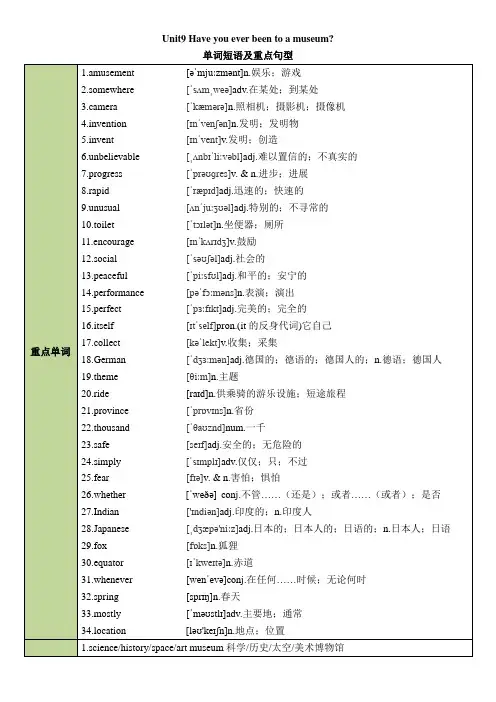
Unit9 Have you ever been to a museum?单词短语及重点句型一、单词讲解1 somewhere adv.在某处;到某处somewhere 不定副词,意为“某地”。
go somewhere different 意为“去与众不同的某地,去某个独特的地方”。
I want to go somewhere different and live alone. 我想去一个与众不同的地方独自生活。
拓展:由some, any, no, every分别加上where构成的副词叫不定副词。
即:somewhere 某个地方, anywhere 任何地方, nowhere 无处,哪里都不, everywhere 每个地方。
2 invent v.发明;创造1)invent 作动词,意为“发明;创造”。
Edison invented the light bulb. 爱迪生发明了电灯。
2)invent还可以表示“虚构”。
The whole story was invented. 整个故事是虚构的。
3)invent的名词形式有两个,一个是inventor(发明者;发明家),另一个是invention(发明物)。
Edison is a great inventor in history. 爱迪生是历史上伟大的发明家。
辨析:invent和discover的辨析:①invent 意为“发明,发明之物”指“从无到有”。
Alexander Graham Bell invented the telephone in 1876. 亚历山大•格雷厄姆•贝尔在1876年发明了。
②discover 意为“发现”,指“本来就已经存在,但不为人知”的事物。
Columbus discovered America in 1492. 哥伦布在1492年发现了美洲。
3 unbelievable adj.难以置信的;不真实的unbelievable作形容词,意为“难以置信的;不真实的”,是由believable“可相信的;可信任的”加否定前缀un派生而来的。
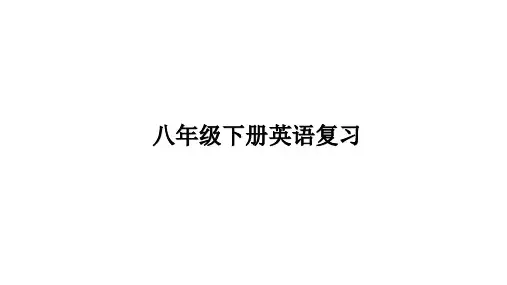
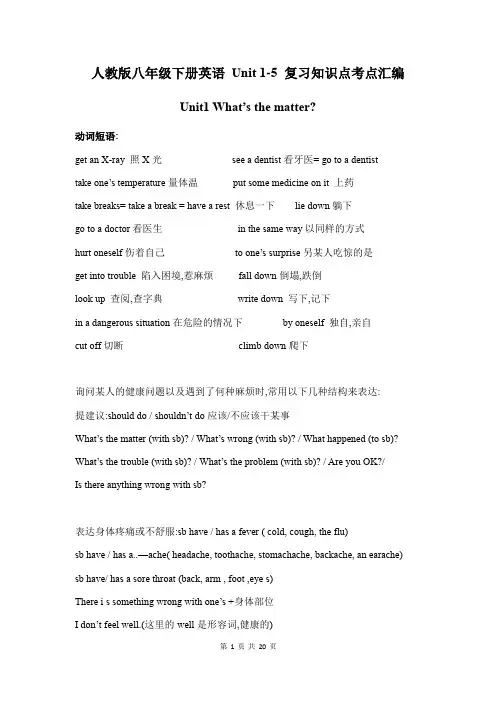
人教版八年级下册英语U nit 1-5 复习知识点考点汇编Unit1 What’s the matter?动词短语:get an X-ray 照X光see a dentist看牙医= go to a dentist take one’s temperature量体温put some medicine on it 上药take breaks= take a break = have a rest 休息一下lie down躺下go to a doctor看医生in the same way以同样的方式hurt oneself伤着自己to one’s surprise另某人吃惊的是get into trouble 陷入困境,惹麻烦fall down倒塌,跌倒look up 查阅,查字典write down 写下,记下in a dangerous situation在危险的情况下by oneself 独自,亲自cut off切断climb down爬下询问某人的健康问题以及遇到了何种麻烦时,常用以下几种结构来表达:提建议:should do / shouldn’t do应该/不应该干某事What’s the matter (with sb)? / What’s wrong (with sb)? / What happened (to sb)? What’s the trouble (with sb)? / What’s the problem (with sb)? / Are you OK?/Is there anything wrong with sb?表达身体疼痛或不舒服:sb have / has a fever ( cold, cough, the flu)sb have / has a..—ache( headache, toothache, stomachache, backache, an earache) sb have/ has a sore throat (back, arm , foot ,eye s)There i s something wrong with one’s +身体部位I don’t feel well.(这里的well是形容词,健康的)Let’s +动词原形./ What (How) about doing sth ? / Why not ( Why don’t you ) do? You’d better do / You’d better not do 最好干某事/最好不要干某事too much + 不可数名词:too much homework 动词+too much : talk too muchtoo many+可数名词复数:too many students much too + adj/ adv : much too tiredhot tea with honey 加蜂蜜的热茶(这里的with是后置定语,修饰tea)away from :远离Stay away from fire.远离火A地离B地的具体距离具体的距离+away from : My home is 500 meters away from my school.Far from:A地离B地很远My home is far from my school.(具体多远不知道)lie 动词,躺、位于,过去式lay , 过去分词lain, 现在分词lying动词,说谎,过去式lied, 过去分词lied, 现在分词lying名词,谎言tell a lie = tell lies说谎lay 动词,下蛋,产卵,放置,过去式laid, 过去分词laid, 现在分词layingsee sb doing sth看见某人正在干某事see sb do sth看见某人干某事的全过程shout for help 大声呼救shout at sb对某人大喊大叫shout to sb对某人大声说话without thinking twice毫不犹豫,不假思索get on 上车get off 下车(大型交通工具)get into / get out of (电梯、出租车等小型交通工具)expect sb to do sth期待某人干某事expect sb not to do sth期待某人不要干某事agree to do sth同意干某事thanks to 多亏了,幸亏= because of = with the help ofin time 及时on time 按时,准时right away=right now = at once立即马上think of想起,认为think about 考虑think about doing sth考虑干某事think over 仔细考虑hit sb in / on +身体部位(软的部位用in,硬的部位用on)run it under water用水冲洗put a bandage on it 用绷带包扎Knives are used to cut things.have trouble (in) doing sth = have problems/difficulty (in) doing sth干某事有麻烦/问题/ 困难have trouble with sth= have problems with sth = have difficulty with sth在某方面有困难be / get used to doing sth 习惯于干某事I am used to getting up early.我习惯了早起used to do sth过去常常干某事(暗示现在不干了)I used to get up early. (暗示现在不。
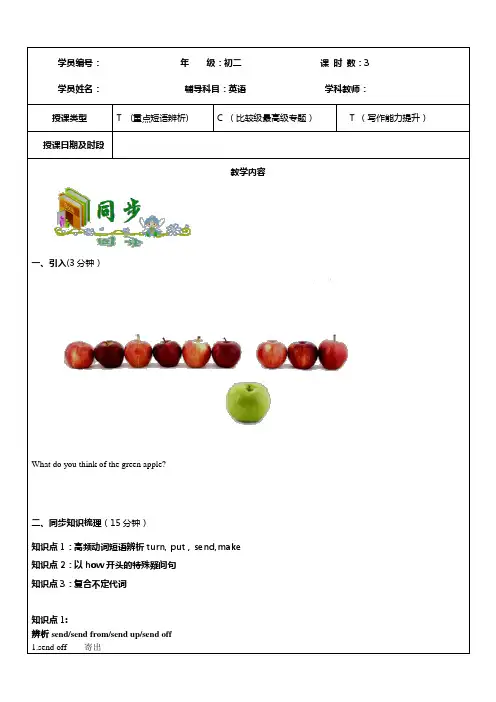
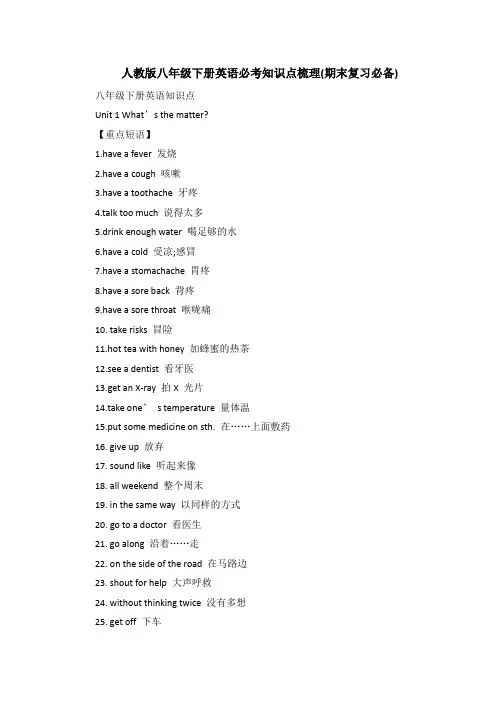
人教版八年级下册英语必考知识点梳理(期末复习必备)八年级下册英语知识点Unit 1 What’s the matter?【重点短语】1.have a fever 发烧2.have a cough 咳嗽3.have a toothache 牙疼4.talk too much 说得太多5.drink enough water 喝足够的水6.have a cold 受凉;感冒7.have a stomachache 胃疼8.have a sore back 背疼9.have a sore throat 喉咙痛10. take risks 冒险11.hot tea with honey 加蜂蜜的热茶12.see a dentist 看牙医13.get an X-ray 拍X 光片14.take one’s temperature 量体温15.put some medicine on sth. 在……上面敷药16. give up 放弃17. sound like 听起来像18. all weekend 整个周末19. in the same way 以同样的方式20. go to a doctor 看医生21. go along 沿着……走22. on the side of the road 在马路边23. shout for help 大声呼救24. without thinking twice 没有多想25. get off 下车26. have a heart problem 有心脏病27. to one’s surprise 另某人惊讶的是28. thanks to 多亏了;由于29. in time 及时30. make a decision 做出决定31. get into trouble 造成麻烦32. right away 立刻;马上33. because of 由于34. get out of 离开;从……出来35. keep on doing sth. 继续或坚持做某事36. put a bandage on sth. 用绷带包扎37. fall down 摔倒38. feel sick 感到恶心39. have a nosebleed 流鼻血40. cut his knee 割伤他的膝盖41. put her head back 把她的头向后仰42. have problems breathing 呼吸困难43. mountain climbing 登山运动44. be used to doing sth. 习惯做某事45. run out (of) 用完;用尽46. so that 以便47. so...that... 如此……以至于...…48. be in control of 掌管;管理49. in a difficult situation 在闲境中【重点句型】1. What's the matter with you?= What'the trouble with you? = What's wrong with you? 你怎么了?2. What should she do? 她该怎么办呢?3.Should I take my temperature? 我应该量一下体温吗?4.You should lie down and rest. 你应该躺下休息一会儿。
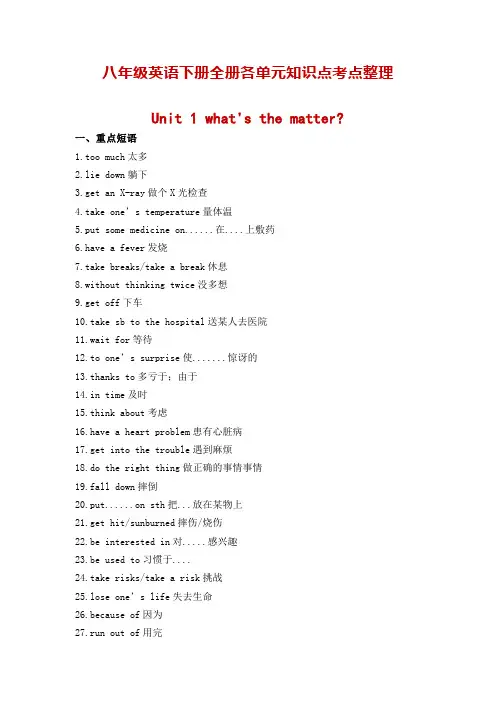
八年级英语下册全册各单元知识点考点整理Unit 1 what's the matter?一、重点短语1.too much太多2.lie down躺下3.get an X-ray做个X光检查4.take one’s temperature量体温5.put some medicine on......在....上敷药6.have a fever发烧7.take breaks/take a break休息8.without thinking twice没多想9.get off下车10.take sb to the hospital送某人去医院11.wait for等待12.to one’s surprise使.......惊讶的13.thanks to多亏于;由于14.in time及时15.think about考虑16.have a heart problem患有心脏病17.get into the trouble遇到麻烦18.do the right thing做正确的事情事情19.fall down摔倒20.put......on sth把...放在某物上21.get hit/sunburned摔伤/烧伤22.be interested in对.....感兴趣23.be used to习惯于....24.take risks/take a risk挑战25.lose one’s life失去生命26.because of因为27.run out of用完28.cut off切除29.get out of从...出来30.make a decision/decisions做决定31.be in control of掌管;管理32.give up放弃主要句型1.It’s+形容词+for sb.+to do sth.做某事对某人来说是…的。
It’s important to do sth.做某事很重要。
最新⼈教版英语⼋年级下册期末复习各单元知识点总复习Unit 1 What’s the matter?⼀、重点短语1. have a (high) fever 发(⾼)烧2. have a cough 咳嗽3. have a toothache ⽛疼4. talk too much 说得太多5. drink enough water 喝⾜够的⽔6. have a (bad)cold (重)感冒7. have a stomachache 胃疼8. have a sore back 背疼9. have a very sore throat 喉咙⾮常痛10. lie down and rest 躺下来休息11. hot tea with honey 加蜂蜜的热茶12. see a dentist 看⽛医13. get an X-ray 拍X 光⽚14. take one’ s temperature 量体温15. put some medicine on sth. 伤⼝上敷药cut oneself 割伤某⼈⾃⼰16. feel very hot 感到很热have a headache 患头疼17. sound like 听起来像18. all weekend 整个周末19. in the same way以同样的⽅式take breaks 休息20. go to a doctor 看医⽣save an old man 拯救⼀位⽼⼈21. go along 沿着……22. on the side of the road 在马路边23. shout for help ⼤声呼救24. without thinking twice 没有多想25. get off 下车26. have a heart problem 有⼼脏病27. to one’ s surprise 使.......惊讶的28. thanks to 多亏了;由于29. in time 及时30. save a life 挽救⽣命hit an old man 撞了⼀位⽼⼈31. get into trouble 造成⿇烦32. right away ⽴刻;马上33. Because of+n.\pron. 由于…34. get out of 离开;从……出萍35. hurt oneself 受伤fall down 摔倒36. put a bandage on sth. ⽤绷带包扎37. run it under water 在⽔流下冲洗38. feel sick 感到恶⼼39. have a nosebleed 流⿐⾎40. cut his knee 割伤他的膝盖41. put her head back 把她的头向后仰hurt his back 伤到了后背rest for a few days 休息⼏天get hit on the head 头部挨打42. have problems breathing 呼吸困难get hit by a ball 被球击get sunburned 晒伤43. mountain climbing 登⼭运动44. be used to doing sth. 习惯做某事be used to taking risks 习惯于冒险45. run out (of) ⽤完;⽤46. so that 以便47. so. . . that 如此… …以⾄于…48. be in control of 掌管;管理49. in a difficult situation 在闲境⼬lose one’s life 丧命cut off half his right arm 切除半边右臂bandage himself 给他⾃⼰包扎50. keep on doing sth. 继续或坚持做某事51. make a decision 做出决定the importance of making decision做决定的重要性52. take risks 冒险go mountain climbing 去爬⼭53. give up 放弃have a serious accident 遇到严重的意外54. talk about health problems谈论健康问题55. give advice 提建议⼆、重点句型1. What’ s the matter?What’ s the matter(with you)?= What’s the trouble (with you)?= What’ s wrong with you?你怎么了?I have a stomachache. 我肚⼦疼。
Unit 4 Why don’t you talk to your parents ?讲义一、Section A1. allow[əˈlaʊ] v.允许,准许My parents don’t allow me to go out at night .我父母不允许我晚上出去。
2. wrong[rɔŋ] adj.错误的,有毛病的There's something wrong with my bike.我的自行车出毛病了。
3. guess[ɡes] v.猜测,估计I guess you are right .我猜你是对的。
4. deal[di:l] n.协议;交易a big deal一件重要的事It’s a big deal.这是一件重要的事。
5. relation [rɪˈleɪʃn] n.关系;联系;交往Relations between them have improved.他们之间的关系有所改善。
municate[kəˈmju:nikeit] v.沟通;交流Why don’t you communicate with your mother ?你为什么不和你妈妈沟通一下?7. communication[kəˌmju:nɪˈkeɪʃn] n.交流;沟通It’s a kind of communication .这是一种交流。
8. argue[ˈɑ:ɡju:] v.争论;争吵Don't argue with me.别和我争辩。
9. elder['eldə(r)] adj.年级较长的My elder brother is very tall.我哥哥很高。
10. instead[ɪnˈsted] adv.代替;反而;却He will be on duty instead of me tomorrow.明天是他值日而不是我。
11. whatever[wɒtˈevər] pron.任何;每一You can buy whatever you like .你想买什么就买什么。
人教版初中英语八年级下册全册各单元知识点、语法归纳整理Unit1W hat’s the matter?一.重点短语归纳1.foot---feet脚tooth---teeth牙齿2.have a cold感冒3.have a stomachache胃疼4.have a sore back背疼5.have a sore throat喉咙疼6.have a fever发烧7.lie down and(have a)rest躺下休息have a rest休息8.hot tea with honey加蜜的热茶9.see a dentist看牙医see a doctor看医生10.drink lots of water多喝水11.lots of ,a lot of,许多。
大量a lota lot of=lots of,可以修饰可数名词复数和不可数名词,一般用在肯定句中。
:There are lots of(a lot of)books in our library.There is a lot of water on the grounda lot,是一个副词词组,跟动词连用;表示十分,很等意思;Thanks a lot.12.have a toothache牙疼13.That’s a good idea好主意14.go to bed去睡觉go to bed early早上床睡觉15.feel well感到好 feel ill感到不舒服I don’t feel well=I’m not feeling well我感觉不舒服.16.start doing/to do sth开始做某事to do是一件事情完成了,开始做另外一件事情doing是原来的那件事情做到一半,现在又开始做了,是同一件事情。
17.two days ago两天前18.get some rest多休息,休息一会儿19.I think so我认为是这样20.be thirsty口渴21.be hungry饥饿22.be stressed out紧张23.listen to music听音乐24.healthy lifestyle健康的生活方式25.traditional Chinese doctors传统中医26.need to do sth需要做某事I have a toothache.I need to see a dentist.我牙痛,我需要去看牙医.We need to keep our classroom clean.我们需要保持教室的干净.27.too much+不可数名词太多的…much too+形/副实在太…极其,非常too many+可数名词复数太多的…28.be good for sth./doing sth.对什么有益,对什么有好处be bad for sth./doing sth.对什么有害be good to对…好be good at=do well in在……方面好,擅长be good(bad) for、be good at的相关用法1.be good for对......有益Doing morning exercises is good for your health.做早操对你们的建康有益。
中考英语总复习资料第12讲八年级英语下册Unit 7--8一、重点词汇1.tour(n.)→(n.)旅行者2.protect(v.)→(n.)保护3.achieve(v.)→(n.)成就;成绩4.thick(adj.)→(adj.)薄的5.include(v.)→(prep.)包含;包括6.succeed(v.)→(n.)成功→(adj.)成功的7.nature(n.)→(adj.)自然的8.weigh(v.)→(n.)重量9.birth(n.)→(n.)生日→(v.)出生→(过去分词)出生10.keep(v.)→(n.)饲养员;保管人11.awake(adj.)→(v.)醒来→(v.)睡觉→(adj.)睡着的→(adj.)困倦的12.excite(v.)→(n.)激动→(adj.)令人激动的→(adj.)激动的13.illness(n.)→(adj.)生病的14.remaining(adj.)→(v.)保留;剩余15.laugh(v.)→(n.)笑声16.beauty(n.)→(adj.)美丽的17.introduce(v.)→(n.)介绍18.success(n.)→(adj.)成功的→(v.)成功二、重点短语1.随便(做某事)2.据我所知3.吸入;吞入(体内)4.面对(问题、困难等)5.即使6.出生时7.到达(某数量、程度)8.大约9.满是……的;(有)大量的10.走路时撞着11.摔倒12.照顾13.因……而死14.科幻小说15.赶快16.自从17.属于18.互相19.砍倒20.在……结尾;在……末端三、重点句型1.珠穆朗玛峰比世界上其他任何一座山都高。
Qomolangma is mountain in the world.2.中国是世界上人口最多的国家。
China has in the world.3.这头大象比这只大熊猫重许多倍。
This elephant weighs more than this panda.4.这些幼崽经常死于疾病并且活不了很长时间。